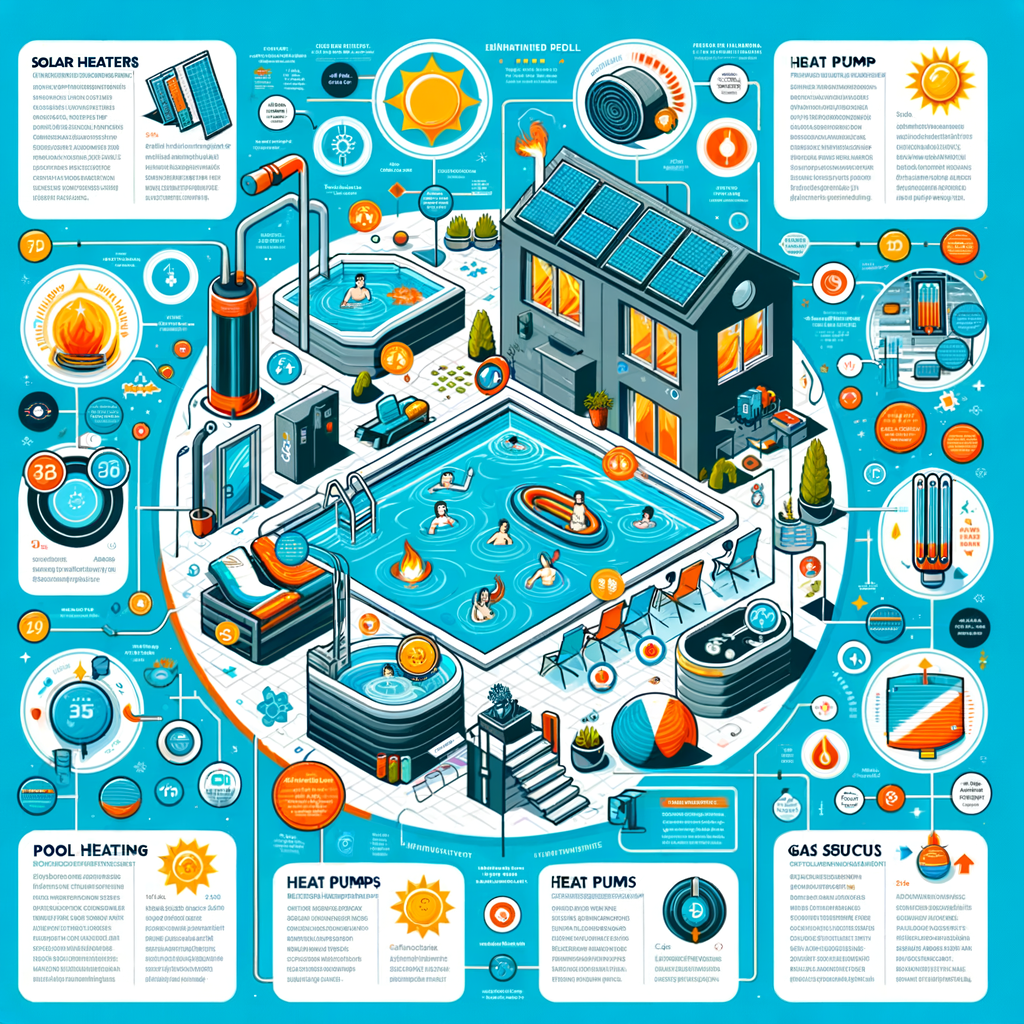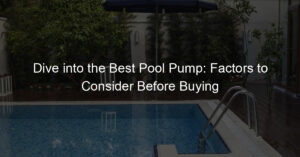
Introduction to Consistent Pool Temperature
Whether you’re a pool owner, a swimmer, or someone who enjoys a good splash, understanding the importance of maintaining a consistent pool temperature is crucial. In this blog post, we will delve into why it’s essential to keep your pool temperature steady and the challenges you might face in achieving this.
- The Importance of Maintaining a Consistent Pool Temperature
Keeping a consistent pool temperature is more than just about comfort; it’s about safety and energy efficiency too. When the water temperature is steady, it’s easier for swimmers to adapt and avoid sudden shocks that can lead to cramps or other health risks. Moreover, a consistent temperature helps to reduce the energy consumption of heating systems, leading to lower utility bills.
- Challenges in Achieving a Consistent Pool Temperature
While maintaining a consistent pool temperature sounds straightforward, it can be quite challenging. Factors such as weather conditions, pool size, and heating system efficiency can all affect the temperature of your pool. For instance, on a hot sunny day, the water can heat up quickly, while on a cold day, it can cool down just as fast. Additionally, larger pools may take longer to heat up and cool down than smaller ones. Lastly, if your heating system is not efficient, it may struggle to maintain a steady temperature, leading to fluctuations.
In the following sections, we will explore various strategies for heating your pool and how to maintain its temperature effectively. So, stay tuned to unlock the secret to consistently warm pool temperatures!
Understanding Pool Heating Strategies
Keeping your pool warm can be a challenge, especially during colder months. But with the right strategies, you can maintain a comfortable temperature all year round. Let’s explore some effective pool heating techniques.
Effective Pool Heating Techniques
There are several ways to heat your pool, but not all methods are created equal. Some are more efficient and cost-effective than others. Let’s take a closer look at the most effective swimming pool heating methods and their benefits.
- Overview of effective swimming pool heating methods
There are three main methods for heating a pool: solar heating, heat pumps, and gas heaters. Solar heating harnesses the power of the sun, making it the most energy-efficient option. Heat pumps use electricity to capture heat and move it from one place to another, while gas heaters burn propane or natural gas to create heat.
- Benefits of using the best pool heating techniques
Choosing the right pool heating method can save you money, extend your swimming season, and reduce your environmental impact. Solar heating, for example, can cut your energy costs by up to 80%. Heat pumps are also energy-efficient and can heat your pool for longer periods, while gas heaters can quickly heat your pool, making them ideal for occasional use.
In conclusion, understanding different pool heating strategies can help you choose the best method for your needs. Whether you prioritize cost-effectiveness, energy efficiency, or speed, there’s a pool heating solution for you.
Energy-Efficient Pool Heating
Introduction to Energy-Efficient Pool Heating
Energy-efficient pool heating is a smart way to keep your pool warm while saving on energy costs. It uses advanced technology to heat your pool using less energy than traditional methods. This not only helps the environment but also reduces your energy bills. Let’s dive into the world of energy-efficient pool heating and discover how it can benefit you.
Benefits of Energy-Efficient Pool Heating
There are many benefits to using energy-efficient pool heating. Here are a few:
- Cost Savings: Energy-efficient heaters use less energy, which can significantly reduce your energy bills.
- Environmentally Friendly: By using less energy, these heaters help reduce your carbon footprint, making them a more environmentally friendly option.
- Longer Lifespan: Energy-efficient heaters are designed to last longer than traditional heaters, meaning you won’t need to replace them as often.
- Consistent Temperature: These heaters can maintain a consistent pool temperature, making your swimming experience more comfortable.
Examples of Energy-Efficient Pool Heating Solutions
There are several types of energy-efficient pool heating solutions available. Here are a few examples:
Type Description Solar Pool Heaters These heaters use the sun’s energy to heat your pool, making them a cost-effective and environmentally friendly option. Heat Pumps Heat pumps use electricity to capture heat and move it from one place to another, effectively heating your pool with less energy. Gas Pool Heaters While traditional gas heaters aren’t typically energy-efficient, some models are designed to be more efficient than others. These models use less gas to heat your pool, saving you money in the long run. Choosing the right energy-efficient pool heating solution depends on your specific needs and circumstances. Consider factors like your budget, your pool’s size, and your local climate when making your decision.
Maintaining Pool Temperature
Keeping your swimming pool at a comfortable temperature can be a bit of a challenge, but with the right strategies, it’s possible. Let’s delve into some effective pool heater strategies that can help you maintain your pool temperature.
Pool Heater Strategies
There are two key aspects to consider when it comes to pool heater strategies: understanding how they work and knowing how to use them effectively. Let’s take a closer look at each of these aspects.
- Understanding Pool Heater Strategies
Pool heaters work by using energy to generate heat and transfer it to the pool water. There are three main types of pool heaters: gas, electric, and solar. Each has its pros and cons, and the best choice depends on your specific needs, location, and budget.
Gas heaters are quick and efficient, but they can be expensive to run. Electric heaters are more energy-efficient but may take longer to heat up your pool. Solar heaters are the most eco-friendly option, but they rely on sunny weather to work effectively.
- How to Effectively Use Pool Heaters
Using your pool heater effectively is all about balance. You need to find the right balance between maintaining a comfortable pool temperature and managing energy consumption.
One effective strategy is to use a pool cover when the pool is not in use. This can help to retain heat and reduce the amount of work your heater has to do. It’s also important to regularly maintain your pool heater to ensure it’s working efficiently.
In conclusion, understanding your pool heater and using it effectively can help you maintain a consistent pool temperature. Remember, each type of heater has its benefits and drawbacks, and the best choice will depend on your specific needs and circumstances.
Effective Swimming Pool Heating
Keeping your swimming pool at the right temperature is crucial for comfort and safety. Let’s explore the key elements of effective swimming pool heating and a case study that demonstrates these principles in action.
- Key Elements of Effective Swimming Pool Heating
There are several key elements to consider when it comes to effective swimming pool heating:
- Heater Type: The type of heater you choose can significantly impact the effectiveness of your pool heating. Gas heaters, heat pumps, and solar heaters each have their pros and cons.
- Pool Size: The size of your pool will determine the size of the heater you need. Larger pools require more powerful heaters.
- Insulation: Proper insulation can help retain heat and reduce the amount of energy needed to keep your pool warm.
- Maintenance: Regular maintenance of your pool heater can ensure it operates at peak efficiency.
- Case Study on Effective Swimming Pool Heating
Let’s look at a case study that demonstrates the effectiveness of these key elements in action.
In the town of Pleasantville, the local community pool was struggling with high energy costs and inconsistent pool temperatures. They decided to invest in a new, energy-efficient heat pump and added insulation around the pool. They also implemented a regular maintenance schedule for the heater.
As a result, the community pool saw a significant decrease in energy costs and a consistent pool temperature year-round. This case study demonstrates how the right combination of heater type, pool size consideration, insulation, and maintenance can lead to effective and efficient pool heating.
Conclusion: Unlocking the Secret to Consistently Warm Pool Temperatures
As we conclude our discussion, let’s take a moment to reflect on the key insights we’ve gathered. Consistently warm pool temperatures are not just a luxury, but a possibility within your reach.
- Recap of pool heating strategies and maintaining pool temperature
Throughout our discussion, we’ve explored various pool heating strategies. From solar heaters to heat pumps and gas heaters, each has its unique benefits. Solar heaters are cost-effective and eco-friendly, while heat pumps provide consistent heat regardless of the weather. Gas heaters, on the other hand, heat up the pool quickly.
Maintaining pool temperature is equally important. We’ve learned that pool covers are essential in reducing heat loss and evaporation. Regular maintenance of your heating system, as well as monitoring and adjusting the thermostat, also play crucial roles.
- Final thoughts on achieving consistently warm pool temperatures
Achieving consistently warm pool temperatures is a combination of the right heating strategy, regular maintenance, and effective heat conservation. It’s about finding the right balance that suits your pool, your budget, and your personal preferences.
Remember, a warm pool is more than just a comfortable swim. It’s about extending your swimming season, increasing the value of your pool, and most importantly, creating enjoyable moments for you and your loved ones.
As we’ve seen, unlocking the secret to consistently warm pool temperatures is not a mystery. It’s a journey of understanding your pool, exploring your options, and making informed decisions. So, dive in, the water’s fine!













